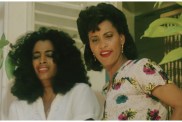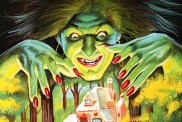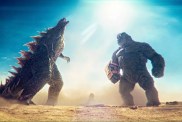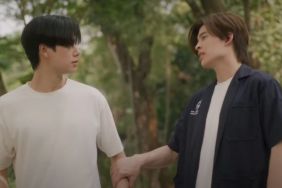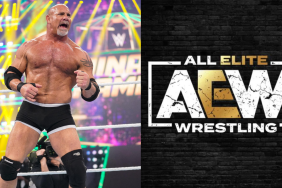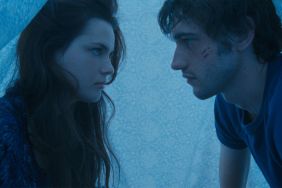In the thirty years that Sir Ridley Scott has been making movies, he’s been building up an impressive filmography that always keeps his fans and critics guessing with the eclectic choices he makes about what to do next. From the sci-fi noir of Blade Runner to historic war epics like Gladiator and Kingdom of Heaven and smaller character-driven pieces like Thelma and Louise and Matchstick Men.
Although some may have ruled Sir Ridley out after the poor showing for his last two films (at least in the United States), American Gangster returns Scott to more ambitious fare, although it’s not quite as vast as something like Kingdom of Heaven or Black Hawk Down, it does have him recreating Harlem and New York City in the early ’70s when Frank Lucas, played by Denzel Washington, ran the billion dollar drug trade that supplied heroin to all of Harlem and much of the Tri-State area. On the other side of the war on drugs is Richie Roberts, played by Russell Crowe appearing in his third film with Scott, a hard-nosed cop who leads the investigation into the burgeoning drug trade that leads him to Lucas and the pervasive police corruption in New York City.
ComingSoon.net attended a series of New York press conferences for the movie, kicking off with Scott, who had a long night at the film’s premiere at Harlem’s legendary Apollo Theater the night before, having come straight from filming his next movie Body of Lies. As always, Scott is an endlessly fascinating speaker about any number of subjects, even when talking about himself.
ComingSoon.net: How was the reception to the movie at its Apollo Theatre premiere last night?
Scott: Generally, I think they really loved it actually. I was a little worried about doing the Apollo, because it’s not a room, it’s a theater, so balancing the sound and the picture and all the kind of thing is always tricky, but somebody did a really good job, so I think it went very well.
CS: There are two major stories running through the movie, Frank’s story and that of Russell Crowe as Richie Roberts, so how did you as a director want to balance the two of them and what was the hardest part of making the movie?
Scott: Once it’s on paper, I spend most of my life reading and developing material or on occasion, not often, a piece of material will arrive that I want to do. I get a lot of scripts sent, but for the most part, ninety-seven percent are not that good, but this one was from a friend of mine Steve Zaillian, who bunged this script at me I think four and a half years ago saying, “What do you think of this?” and he was a producer as well. I was off doing something else, but his material is always quite special, and it’s really been distilled very well onto paper where he’s thought about it. He’s a very thoughtful, very sensitive writer. So honestly, once I got it and came on board with Brian (Grazer) I said, “At a hundred and sixty five pages, I’ll sit with you and maybe it would be better for me to do my homework.” I’ll sit down with a yellow marker and go through a hundred and sixty five pages basically going, “I don’t really need that, I don’t really need that. I gotta have that.” And marking in pink what I got to have. So what it does is, it informs me and makes me really, really address the movie because it’s my job particularly once you get successful, it’s very easy just to take a script and say, “Yeah, I’ll cast him and her,” and then you zoom into it and say, “I can do it from this hotel room.” But this needs way too much thought, and when you get a great piece of work like Steve can put on paper, you have to address it really carefully. It makes you organically feel the dynamics of the film, and once I know that it’s in my head. Once I’ve done my homework–providing he’s agreed with that and said, “Well, I agree with that, I don’t agree with this”–so there’s a bit of a give and take and then you actually have it in your head. When I begin I actually have it right here, I virtually don’t need a storyboard.
CS: What about the dynamic between the two actors?
Scott: That’s the most attractive thing about it. One, they will never meet each other until about fifteen minutes from the end. That’s really a big challenge and very unusual. Unusual is good. There’s nothing really usual about this movie, and also the unusual side of the two universes of two characters where you can really question, “Do we really need Richie’s wife? Do we really need the fact that he’s getting divorced? Do we really need the fact that he’s got a dysfunctional private life? Do we really need the fact that Frank Lucas family comes?” All those things, yeah you have to have it all because these two people are going to function basically by themselves as two leading characters where they haven’t got each other to play off. That isn’t going to happen until twenty minutes from the end. So from my point of view and the balancing act I have to do, I’ve got to make each universe so rich so you are very satisfied to sit there and watch that section evolve and move on, then counteract and counter cut with suddenly, you are going from Frank going to Vietnam and you suddenly cut to a park and see a guy walking his wife and kid and he’s got a rovingeye, and he’s being told that he hasn’t got any room in their life. That’s a great dynamic. So you’re going that way and suddenly you are going that way. That makes you pay attention.

CS: What about the two actors? Was it very different Working with Denzel and Russell?
Scott: When you’re that good, it’s a bit like playing tennis. Roger Federer is Roger Federer. You get both of them on the bloody court, you never quite know who is going to win. They’re consummate actors and at the absolute peak of their career, so it’s very similar working with them in that sense because it’s that level.
CS: How did the script change once you came on board from the earlier version which was supposed to be directed by Antoine Fuqua?
Scott: I wasn’t involved (back then). I was handed it five years ago. I wanted to make it two movies and in that time, it dawned on me this hadn’t been made and I hadn’t been tracking it of course. I was then working with Russell in France and I said to him, “Did you ever read “American Gangster”? He said, “Yeah, Brian had sent it to me with a view to me being Richie, but there wasn’t really enough there.” I said, “It was good though” and he said, “Well, yeah there was something there definitely,” but he said, “I want to play Frank Lucas.” And I said, “Well you can’t.” (laughter) He said, “Why not?” and I said, “Come on Russell.” So I then called Brian saying, “Listen I think we can get lift-off here and we should go back to Denzel.” Brian did that and I think Denzel laughed and said, “Oh no, not again.” I then read three versions just in case, so there was Steve Zaillian at 165 pages, actually 170 pages when I read it. There was Terry George who had come in and redid it his way; he kept not a lot of the original, and then there was Richard Price who came in writing I believe, it must have been for Denzel and Antoine. That was the way it was. I read all three and honestly in a nutshell, straight back to the original. I said, “This is the one I’m interested in.”
CS: Did you deliberately try to shoot the movie in a specific order as far as trying to shoot Russell’s stuff first or Denzel’s stuff first?
Scott: No, that comes down to availability, so there’s no intellectual choice in that. It’s just who’s going to be ready to do this and who is the most practical of doing this first? Because Russell essentially had
actually he’s on the screen eight minutes less than Denzel, so when somebody said, “You know. He’s awfully good. He’s actually really, really, really good, but he’s on screen a lot.” I said, “There’s eight minutes difference actually.”
CS: Did you have the real Frank Lucas’ permission to make the movie?
Scott: Yeah, absolutely. Do you think Frank didn’t want this movie made? Oh, yes he did.
CS: Did you get to spend any time talking to him?
Scott: Sure. I mean, I was going to meet with Frank because Denzel said, “You’ve got to meet with Frank.” Frank Lucas came to my office in New York. I thought it would be for a half hour cup of coffee. Five and a half hours later and two bottles of red wineand I thought he didn’t drink, Jesus Christ–and we really got to actually talk about Westerns and how he wanted to be in a Western. I said I’ll have him in a Western, so that went pretty well.
CS: What was the most interesting thing you found about Frank?
Scott: The fact that he’s not a normal person. I’d say, “Any regrets? Any remorse? Were you ever afraid? When? For what reason? You’re going to a war zone in Vietnam and worse you are going to go into the hills and you’re going to meet Chinese drug lords who will cut your liver out, leave you to the ants and no one will ever hear from you again in three seconds. I would think that’s much more dangerous than Harlem at that point.” He said, “Never. Never even thought about it. I walk the streets. Where I am in the streets, that’s the jungle. I wouldn’t compare the jungle of Harlem with the edge of that world between war zones and Chinese poppy groves. I’d say I’d take Harlem any time.” But he never thought about it.
CS: Did he have regrets about the drugs?
Scott: Never. As far as he’s concerned that was their fault. That was their problem. He barely smoked, he didn’t drink. I mean never, ever, ever even considered taking a drug.
CS: Would you consider him a sociopath?
Scott: Yeah, I think that’s the best word for it and that entails
sociopath is not a pleasant description at all. Sounds cosmetic, but if you actually distill it, it’s pretty lethal.
CS: Would Denzel agree with that?
Scott: Yeah, I think so, yeah.

CS: Your movies have had a very singular urban visualization, so how did you bring that to New York? Were there any specific touchstones?
Scott: I had the best touchstones when I was here. I came here on a travel scholarship in 1960. I got a job in a very menial form, even though I spent seven years in art school, got this great travel scholarship, I ended up making coffee and getting hamburgers for Don Pennebaker and Richie Leacock in a company of filmmakers called Drew Associates. I worked literally in the backroom literally syncing up rushes. Seven years of art school and I’m watching rushes. I’m watching drifting sink and what they called in those days was Nagra, the invention of crystal sync. You actually would eventually have no cables and I would watch rushes where I watch Jack Kennedy’s rushes when he was doing primaries. When he won against Hubert Humphrey, I think it was Massachusetts. I also worked on a documentary called “Nehru” with Nehru who was the Prime Minister of India, and one on Eddie Sachs, an Indianapolis racecar driver and I was an assistant for a year. That’s what got me interested in film; I must do film. I dropped design and went into film. I think I drifted off the question. What was the question? Ah, New York. (laughter) I do that. It’s not my age. I get so engaged in what I’m talking about I go on tangents. I used to walk the streets of New York then because I have a very good eye and I had to invest in a really great camera with a fifty-millimeter lens and I spent days and days in Harlem, inside the Bowery and a lot of stuff on Coney Island, and so I got the smell of New York at that point. Then I started doing commercials very successfully and would come into New York at least once a month right through the ’60s and ’70s and ’80s so I knew New York really well. Who dressed what, how they dressed. That’s why you get that very reined-in view, because if people do a film about the ’60s and ’70s they think it’s all like the Beatles. It’s not like that. There wasn’t that kind of money on the streets. So there were only the high-end elitists groups who might have been gangsters or might have been moneyed people, who would be able to dress like that. People would have the same suit for twenty years. It was much shabbier, so I reined it back and made it shabbier. I think that’s what feels so real about it. Harlem was really, really shabby, beautiful brownstones falling apart.
CS: I understand you set a record for the number of locations on this movie, so can you talk about that?
Scott: One hundred and eighty locations is ludicrous. Thirty-five is reasonable. So there’s about one hundred and eighty locations in five boroughs. Right now in the movie, I have about thirty-five or forty speaking parts and this is a hundred and thirty speaking parts so there’s like millions of pieces of minutae, but that’s what is so interesting about it. I think that’s what could easily take a position as a talking movie, but somehow it’s not. There’s a lot of talking, but it doesn’t feel like it’s a talky talky movie because there’s millions of bits of pops which all seem to be driving in the same direction.
CS: When you have 180 locations, where do you start?
Scott: Five boroughs. Yeah I’m in the five boroughs. In Harlem there may be fifty or sixty locations, so we’d be there this afternoon, there late afternoon, tomorrow morning we’re going to be down there. I found several interiors that haven’t been touched since the ’40s. I just walked in and said, “Don’t touch it” and they said, “But it’s not healthy.” and I said, “I don’t care. Get masks” and we’d just shoot in the house.
CS: Were all of them actual locations?
Scott: Oh, yeah, everything in there is real. The only thing we built was his coffee shop. We built that. That doesn’t exist. One of the toughest things about Harlem
people talk about Harlem perceived as a village, but it’s not a village at all. It’s an area of wide-avenued boulevards for the most part, and they’re hard to shoot. It’s hard to get an angle because you gotta a whole bunch of concrete pavement down the middle. Where there oughtta be trees that have been removed and didn’t survive. That part of Manhattan was kind of always planned a little bit like Paris. If you think about the University up there now, which is now starting to look really posh. Parts of Harlem are starting to look very posh. If you had trees down that main boulevard it would be as wide as Paris, and there was none of that and that’s hard to capture. I went to the most dense crossroads on that wide boulevard and I said, “We’re going to build a cafe right here.” Right next to the news agent, who’s got a booth as big as this table. We pushed the café right against his booth. In fact, his booth had been there since the thirties, so it was a metal booth, one of those booths that’s almost like a work of art. He was just tickled by that. So we just copied that booth and made a café.
CS: Was Frank Lucas on the set every day?
Scott: Every day.

CS: How was he received? Was anyone in Harlem bitter or angry about him being back on the streets there?
Scott: I don’t know. I never heard anything about it. I thought there might be a problem at some point, but the closest angry person now might be twenty years ago. Nicky Barnes is probably a little pissed off.
CS: This movie seems to reveal a lot of dirty little secrets about the trade, so did you ever get the impression that the powers that be might not want to see this movie to come out?
Scott: Nah, I think the powers that be, they like to bathe in the limelight, don’t they? That’s what makes them tick, those guys. They don’t care. They really don’t care. So no, I never even gave it a second thought. Should I? Is there something I don’t know? (laughter)
CS: There’s a lot of attention right now on your entire filmography with the latest version of “Blade Runner” that you were involved with being released. Do you thing you’ve changed a lot since making that movie or do you feel that you’ve remained on a steady path?
Scott: The change comes in confidence, because when you first do a film, you don’t get a lot of work. When I first did movies, I had done a lot of commercials and actually, I had an office here, an office in London, and an office in L.A. I was really flying in the business world, but I hadn’t done a film. When I was thirty-nine I hadn’t done a movie. So I thought I’d better think about it quick and so I started to use some of that money to find good writers and the first one up was “The Duelists”. “The Duelists” experience was great because I was working long-form. It wasn’t thirty seconds or sixty seconds. I really enjoyed it and it was kind of pretty easy. We did well with that because we went to Cannes and got the prize at Cannes, and then “Alien.” That was pretty easy as well. This seemed to be easy, you know? I wasn’t getting thrashed yet, and then I went to Hollywood, which was the first time I ever went to Hollywood as a director. I had done commercials, but it was the first time I was doing a studio film. Because I’m essentially not a kid, but metaphorically the “new kid on the block” there because I followed through with “Alien” which was last year’s best good news. There was a lot of attention, and Hollywood people have a habit of bringing people to Hollywood on the admiration sled and then they actually try and turn it around to another hill and say, “Now we want you to do this.” And you say, “But I don’t do that.” They’ve ruined more good potential people who don’t stand their ground and get pushed down a hill they don’t want to be on and they crash down in the trees at the bottom and never go back. I was too hardy. I was giving as good as I got, so I was very unpopular because I was used to running companies and I really didn’t give a sh*t. All that matters was the movie. So at twenty five years old, I was right. My confidence at the time I was like definitely sitting in my apartment in Hollywood going, “Oh god, I don’t like this.” I was being beaten up a lot, and I think eventually what you do is you get that in its place, or otherwise you can’t function. As a producer with a director, I’m like the best coach of looking at him in the morning and saying, “You’re looking good” even though he looks like sh*t. “You’re going to do good out there. You’re going to be fantastic. We’re going to fly through the day.” As opposed to, I met with four guys in blue overcoats sitting in my trailer and say, “If you don’t move quickly today we’re just going to rip the scenes out.” I thought this is not going to get the best out of people, so I got that into place so now I just chug along doing my own thing as much as possible, because I love to work hard. I came from a night shoot in Rabat 22 hours ago and I’ll land at five am Monday morning, I’ll get a shower and go to set with Leo DiCaprio. I’ve been shooting with him now for about seven weeks, so I’m nearly half way through in Morocco.
CS: Can you talk about that movie, “Body of Lies”?
Scott: David Ignatius, “Washington Post”. Anyone know him? Foreign correspondent. So he wrote a book called
it’s actually coming out or it’s just been out called
the best title was “Penetration.” His expertise and knowledge is thirty years in the Arab states and therefore that’s really his thing, that’s really his world. It’s about what we haven’t done, how we’ve f*cked up, how we’ve misunderstood everything and not they us, us them. It’s a very good script. Bill Monahan wrote the script with Steve King coming in and doing some corrective stuff. So it’s with Leo and Russell Crowe. Russell Crowe is done. I’ve shot with Russell for the last five weeks. That’s why he’s so sturdy looking at the moment. He’s losing his weight. He was thirty pounds overweight to do the part.
American Gangster opens nationwide on Friday, November 2. Check back next week for our coverage of the press conference with Russell Crowe and Denzel Washington, as well as an all-too-brief exclusive interview with Common.
